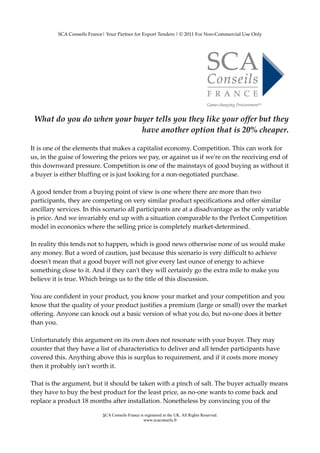
What do you do when your buyer tells you they like your offer, but they have another option that is 20% cheaper
- 1. SCA Conseils France| Your Partner for Export Tenders | © 2011 For Non-Commercial Use Only What do you do when your buyer tells you they like your offer but they have another option that is 20% cheaper. It is one of the elements that makes a capitalist economy. Competition. This can work for us, in the guise of lowering the prices we pay, or against us if we're on the receiving end of this downward pressure. Competition is one of the mainstays of good buying as without it a buyer is either bluffing or is just looking for a non-negotiated purchase. A good tender from a buying point of view is one where there are more than two participants, they are competing on very similar product specifications and offer similar ancillary services. In this scenario all participants are at a disadvantage as the only variable is price. And we invariably end up with a situation comparable to the Perfect Competition model in econonics where the selling price is completely market-determined. In reality this tends not to happen, which is good news otherwise none of us would make any money. But a word of caution, just because this scenario is very difficult to achieve doesn't mean that a good buyer will not give every last ounce of energy to achieve something close to it. And if they can't they will certainly go the extra mile to make you believe it is true. Which brings us to the title of this discussion. You are confident in your product, you know your market and your competition and you know that the quality of your product justifies a premium (large or small) over the market offering. Anyone can knock out a basic version of what you do, but no-one does it better than you. Unfortunately this argument on its own does not resonate with your buyer. They may counter that they have a list of characteristics to deliver and all tender participants have covered this. Anything above this is surplus to requirement, and if it costs more money then it probably isn't worth it. That is the argument, but it should be taken with a pinch of salt. The buyer actually means they have to buy the best product for the least price, as no-one wants to come back and replace a product 18 months after installation. Nonetheless by convincing you of the SCA Conseils France is registered in the UK. All Rights Reserved. www.scaconseils.fr
- 2. SCA Conseils France| Your Partner for Export Tenders | © 2011 For Non-Commercial Use Only 'mimimum requirements' argument above, they may also convince you to take that 20% hit on your premium product. Indeed you may be tempted, as the way the buyer has skillfully conveyed the situation has made you believe that you are categorically sidelined unless you drop your price. It is important at this stage to recognise that you are never going to get away with giving nothing. Psychologically it works wonders by conceding on ones price, even if it is 5%. The key is damage limitation therefore, to make the buyer think they've won big whilst you concede the strict minimum. Examples of damage limitation are as follows, – Compliance with the buying specification. If someone else offers your product at a 60% discount, it is probably not the same product. One must insist on adherence to the specification and that whatever you give it is on the understanding that your product is being compared fairly. – Physical comparison. Is it possible to arrange for competing parties to line their products up side by side to show your superiority? Bear in mind this will entail an investment on your part in the guise of a free sample. – Find the differentiator. You shouldn't be afraid of pressing the buyer for information so as to be able to point out what makes you different. Once you have this differentiator, you can either use it to reinforce your position, or to concede it and pass the saving onto the buyer. ________________________________________________ SCA Conseils France is a tender consultancy specialised in the French market. We are here to provide timely and astute advice from the moment you receive an enquiry relating to an export project in French-speaking markets. For more information on how we can help, please click here. SCA Conseils France is registered in the UK. All Rights Reserved. www.scaconseils.fr
